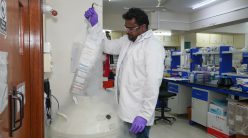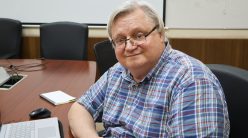Healthcare professionals across the world have been working relentlessly during the pandemic. With dozens of cases reported from IISc, Connect spoke to doctors at the Institute’s Health Centre about their experiences during these challenging times.
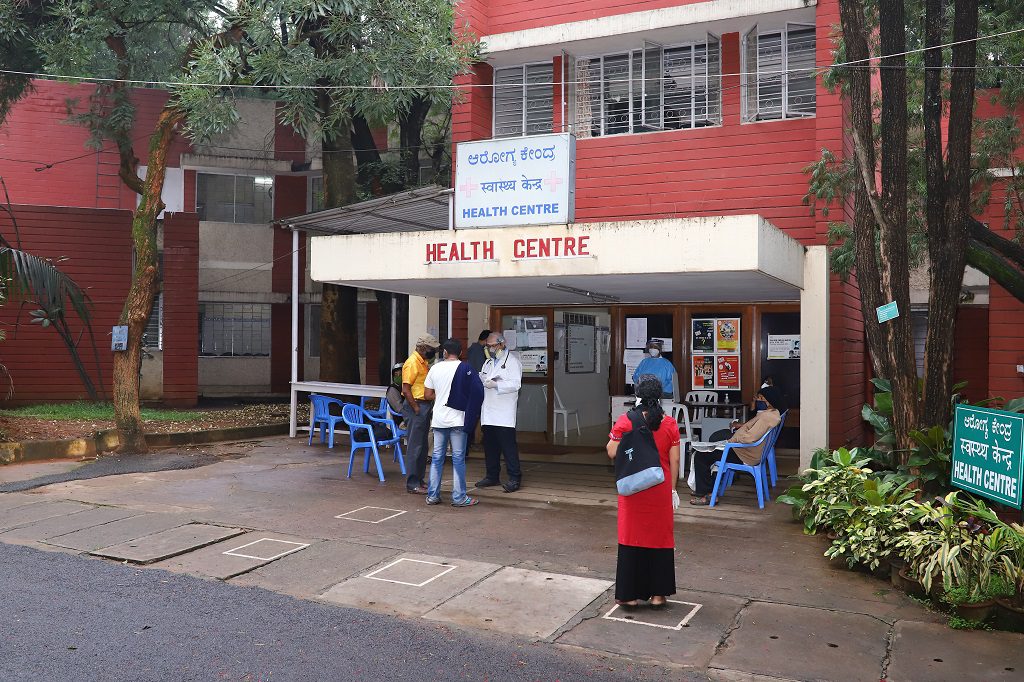
What changes did the Health Centre have to make, in order to deal with the pandemic?
Dr R Nirmala: Several changes have been made at the Health Centre during the ongoing pandemic. We set up our own COVID-19 sample collection and Rapid Antigen Test (RAT) centre, and had to hire extra personnel such as a swab technician, to handle the increasing workload. These personnel were also involved in the follow-ups on all COVID positive patients on campus. We now have 63 staff members.
Shanmukha Innovations set up a sample collection kiosk, and provided an ambulance that has been specifically assigned to transport COVID-19 patients. Suspected COVID-19 patients were examined at a separate flu corner. The current flu corner has two isolation beds to manage patients till the point that they are shifted to a hospital.
We also invited specialists to talk about COVID-19, and conducted Q&A sessions for the students and campus community.
The Health Centre issues regular advisories for the campus community about quarantine and testing norms, and also conducts COVID-19 screening tests for hostel dwellers.
Dr Apoorva Nagarajan: We started seeing patients outside the Health Centre, near the entrance, to reduce patient crowding and interactions inside. We also use protective gear like respirators, Personal Protective Equipment (PPE) kits, gloves, N95 masks and face shields.
We established our own sample collection centre for prompt diagnosis and treatment of patients, and created an isolation centre for mildly symptomatic students who were kept under observation.
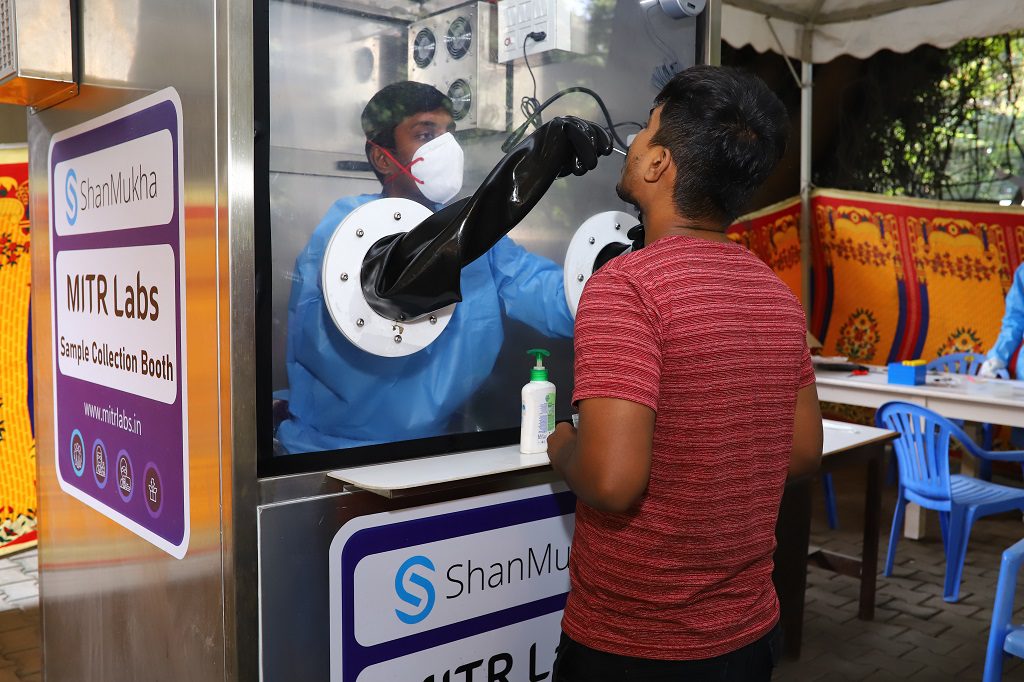
What brought about the setting up of a COVID-19 sample collection and testing centre at the Health Centre?
Dr R Nirmala: At the start of the pandemic, when we slowly started getting more symptomatic cases, we found that getting a COVID-19 test took considerable effort. Most tests then were done only in government hospitals, and patients were hesitant to go and get themselves tested there. The few private institutions that were doing the tests were very expensive, and retired employees could not afford them. Hence, we felt that we needed to start our own testing facility. It would give us the necessary freedom to test and isolate COVID positive persons, and at the same time would be easy to access, economically feasible and reliable. The testing centre was set up in collaboration with the Bruhat Bengaluru Mahanagara Palike (BBMP) and the Centre for Infectious Diseases Research (CIDR) at IISc. Since the setting up of the sample collection centre on 5 September 2020, we have collected around 500 samples. These samples are processed at CIDR. Needless to say, this has helped us to keep the COVID-19 infections under control in the hostels, and on campus.
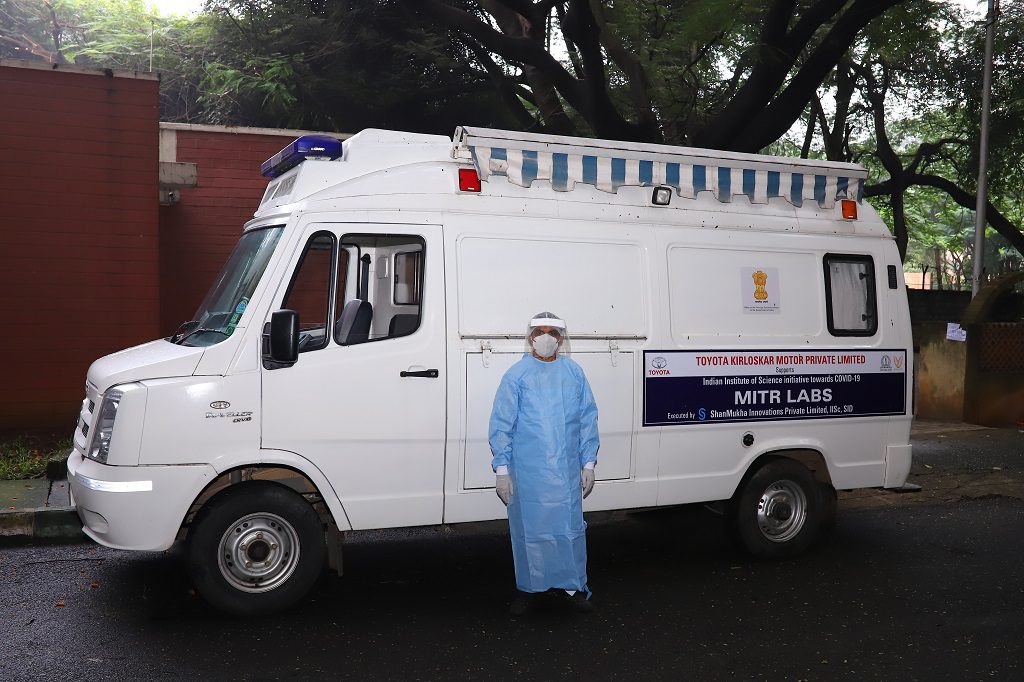
How has the Health Centre been managing regular appointments/non-COVID-19 emergencies or cases?
Dr R Nirmala: The Health Centre was fully functional during the days of lockdown. Patients were seen as usual for non-COVID-19 infections and emergencies. The Out-Patient Department (OPD) functioned as usual. The only difference was that the waiting area for patients was moved to the open area outside of the main building, to reduce the chances of cross-infection. All patients and patient attenders were thermally scanned before being allowed inside for examination.
Dr Apoorva Nagarajan: Non-COVID-19 cases are seen in the OPD and on an emergency basis on holidays. We evaluate them outside the Health Centre and issue medicines. Telephone and video consultations are also encouraged.
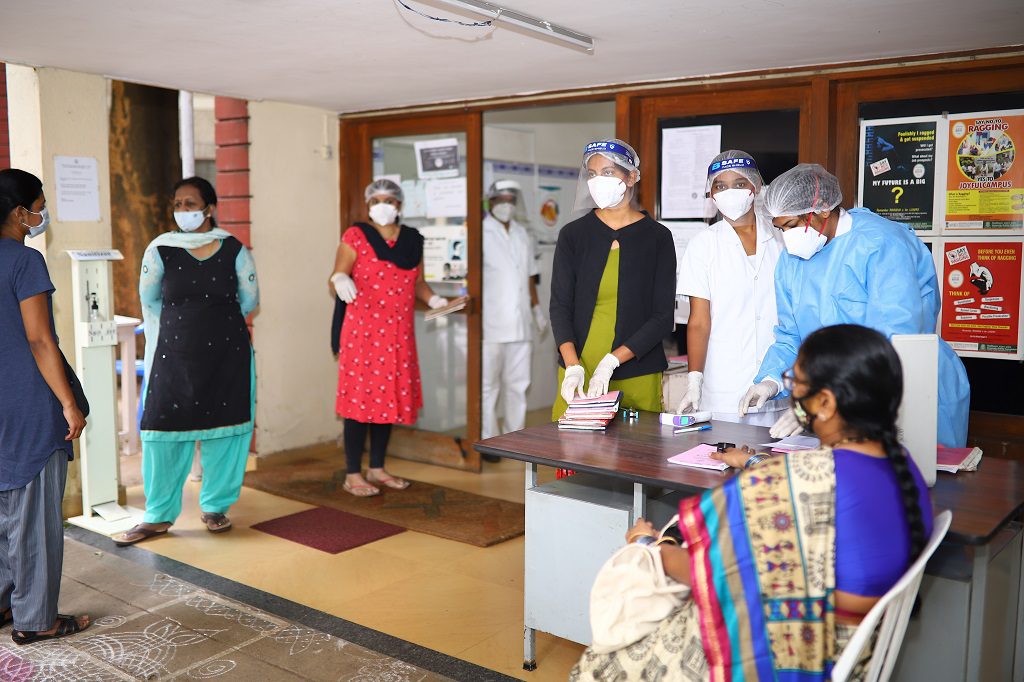
How does the Health Centre liaise with doctors and hospitals outside campus to find hospital beds for IISc’s COVID-19 patients? What is this process like? Has there been any situation in which the Health Centre struggled to place a patient?
Dr R Nirmala: It has been a challenge to find beds for patients, especially during the initial days of the pandemic when BBMP was not well prepared. We have encountered many situations where we found it difficult to find beds for patients. As time passed, we were able to identify and liaise with doctors and management personnel at different hospitals in the city. On several occasions, we have made personal calls to hospitals and explained the case summary of the patient, and requested them to arrange for a bed. Meanwhile, BBMP also came up with the centralised bed allotment facility which has now eased the burden to a great extent. IISc has also entered into an MoU [Memorandum of Understanding] with MS Ramaiah Hospital for COVID beds, which has helped us a lot.
Does the Health Centre have a system to monitor the health of patients on campus?
Dr R Nirmala: All COVID-19 positive patients on campus are contacted by the Health Centre two times a day, to check on them till they clear their quarantine period. A WhatsApp group which includes all doctors and all students in isolation has been set up as a channel for communication. Regular phone and video consultations are also permitted on a needs basis.
“We support them not just by issuing medicines, but try to help them recover in every way possible by providing emotional and moral support also”
Dr Apoorva Nagarajan: Yes, each doctor calls and checks on their patients regularly. We support them not just by issuing medicines, but try to help them recover in every way possible by providing emotional and moral support also.
The Health Centre had to be shut down for disinfection in July, after a staff member tested positive. What was it like to come back to work after that?
Dr R Nirmala: When we had to shut down due to a staff member testing positive, my morale was down. The general feeling was, “Who will be next?” Returning to work was scary, especially with an elderly parent at home. As I started seeing more COVID positive patients, I used to wait restlessly to see if I would start showing symptoms too, but over time, I realised that following ground rules, using appropriate PPE and maintaining hand hygiene (health care workers cannot maintain social distance with a patient) go a long way in keeping a healthcare worker safe.
Dr Anusha Narayanan: The unfortunate incident of our staff testing positive showed that the infection had, indeed, come closer to us. The possibility of the Health Centre being a point of contact for others to acquire the infection mandated the decision to alter our functioning, while making sure that regular services were not hindered. The protective gear provided to us has also helped a great deal!
Dr Aditya Malladi: It was quite a challenge to come back. We took all the necessary precautions. The fact that my patients needed me kept me motivated.
What is it like to work as a healthcare provider during a pandemic, and to interact with people who may be infected?
Dr R Nirmala: Initially, when I had to go to the Centenary Visitors Housing (CVH) to see and refer a couple of COVID positive patients to a hospital (it was the first case on campus), I was frightened to even go near them, because I was not sure whether the PPE I was using would protect me. I maintained distance and was not happy about it because as a doctor we need to see patients up close. After some research, all doctors were given a 3M respirator, and now I go near COVID positive patients with confidence. Also, as the number of cases increased, I could see that even basic PPE like surgical masks and hand gloves keep healthcare professionals safe. Earlier on during the pandemic, I was experiencing constant internal turmoil – on one side with my duty as a doctor, and on the other side with the fear of carrying the infection home. This turmoil has now eased a little with the knowledge that has been gained after seeing several COVID positive patients. The pandemic has shown me how valuable life is, and now I find myself very happy doing small things such as completing kitchen chores, cooking something good for the family, spending time with my son and sometimes just sitting idle!
Dr Anusha Narayanan: The very first lesson we were given in medical school was to never fear a disease. Fear clouds the mind and interferes with our thinking. That being said, the risk of acquiring the infection from the workplace for a healthcare provider is very real. Most of us have had to make a lot of changes in our working routines as well as our lifestyles to protect our patients and families from the virus. For example, I have an ‘unclean corner’ at home where I leave my work-related things. I am very careful when I meet friends or family, knowing that I could always be potentially infected, and do not want to pass it on to others. At work, just to drink water takes a whole lot of effort and time, in taking off PPE the correct way, washing up and making sure there is no one else in the room while my mask or respirator is off.
“At work, just to drink water takes a whole lot of effort and time, in taking off PPE the correct way, washing up and making sure there is no one else in the room while my mask or respirator is off”
Dr Apoorva Nagarajan: It is intimidating, but the satisfaction when someone gets cured and thanks you and blesses you is truly gratifying.
Dr Aditya Malladi: Even if I’m aware that a patient is infected, I perform all that is necessary. To relieve the pain and anxiety of a patient gives a lot of satisfaction. A lot of precautions are needed to withstand an unknown and invisible enemy. It is even more frightening when I think that I might carry the virus to my home.
Do you have any personal anecdotes from these trying times that you would like to share?
Dr R Nirmala: The most challenging event was when I could not find a hospital bed for a sick student. This happened during the start of the caseload spike when the testing facility was not yet established. The student presented to the flu corner with a mild cold and loss of taste and was isolated and tested in a private lab. The test results came on the fourth day, by which time she had a severe dry cough and was very sick. A private hospital promised a bed for her over the phone, but when she went there in the ambulance they refused. This sick student was out in the ambulance without help. I desperately started calling all the hospitals but there were no beds available. This was a time when nobody knew how to get beds in hospitals for COVID-19 patients. The student was getting sicker by the minute in the ambulance, to the point where I was worried that she would collapse. Finally, Dr Sridhar from St Theresa’s Hospital understood my dilemma and offered a bed, but wanted someone to come and sign forms on her behalf. I had to convince a friend to go to the hospital and sign the forms, and the student was finally admitted. Dr Sridhar still answers my phone promptly, and has helped me many times over the past months when I had difficulty finding beds. Though I never knew him before the pandemic, he helped me that day. I think that I have been able to manage so far with the help of so many helpful people: Dr Satyavathi from BBMP, Sriramapuram who helped us screen all the Health Centre staff when we were closed due to a positive case as well as in the screening of 129 students from the New Girls Hostel, and also helped IISc to establish a COVID-19 testing facility; Dr Sridhar from St Theresa’s; Mr Arun, Ms Vidya and Mr Naveen from BBMP; Mr Praveen from Sparsh Hospital; Mr Shanmugam from Vikram Hospital and Mr Pranam from Columbia Asia Hospital.
Dr Anusha Narayanan: It is definitely not easy being a doctor during a pandemic! We need to make sure that patients who do acquire the infection get treated while others do not get infected. At the same time, we cannot afford to miss diagnosing or treating other diseases, especially during health emergencies. I have seen a few patients succumb to the virus. Seeing a patient die is more painful to a doctor than anyone can possibly understand. There also have been instances where patients have miraculously survived the infection, even after having moderate to severe illnesses. These heartening moments reinforce the commitment we made to our community as medical professionals.
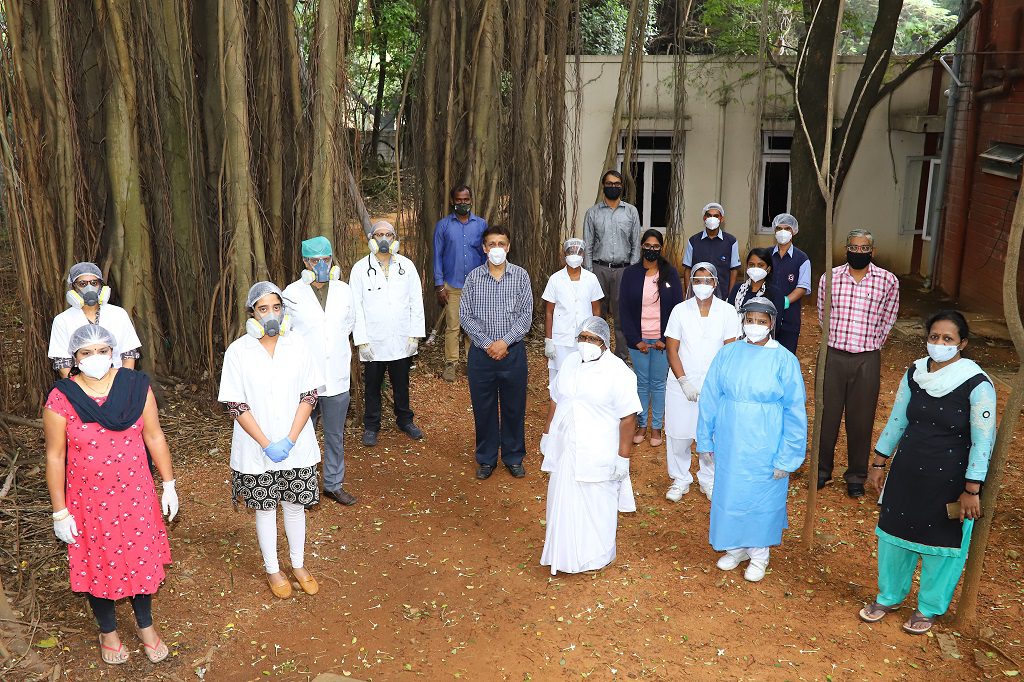
Dr Aditya Malladi: A funny thing happened initially – people were unable to recognise me in my full PPE kit. I still have to keep introducing myself.
Dr Apoorva Nagarajan: I would like to say that it is definitely a difficult task to interact with suspected COVID-19 patients on a daily basis, and then go back home and hope not to infect your family members. But of course, the pandemic has taught us so much about handling tough situations with a clear head, and to trust our decision making above all.
It was extremely hurtful when it was brought to our notice that there were some hate messages circulating on WhatsApp and social media, about the doctors and the Health Centre. We reported this to our superiors, who informed the Director, and an inquiry is currently underway.
We are only trying to help the IISc community fight this virus as strongly as possible. We want to be a community of self-sufficient, smart individuals who adhere to norms and contain this infection as soon as possible.



